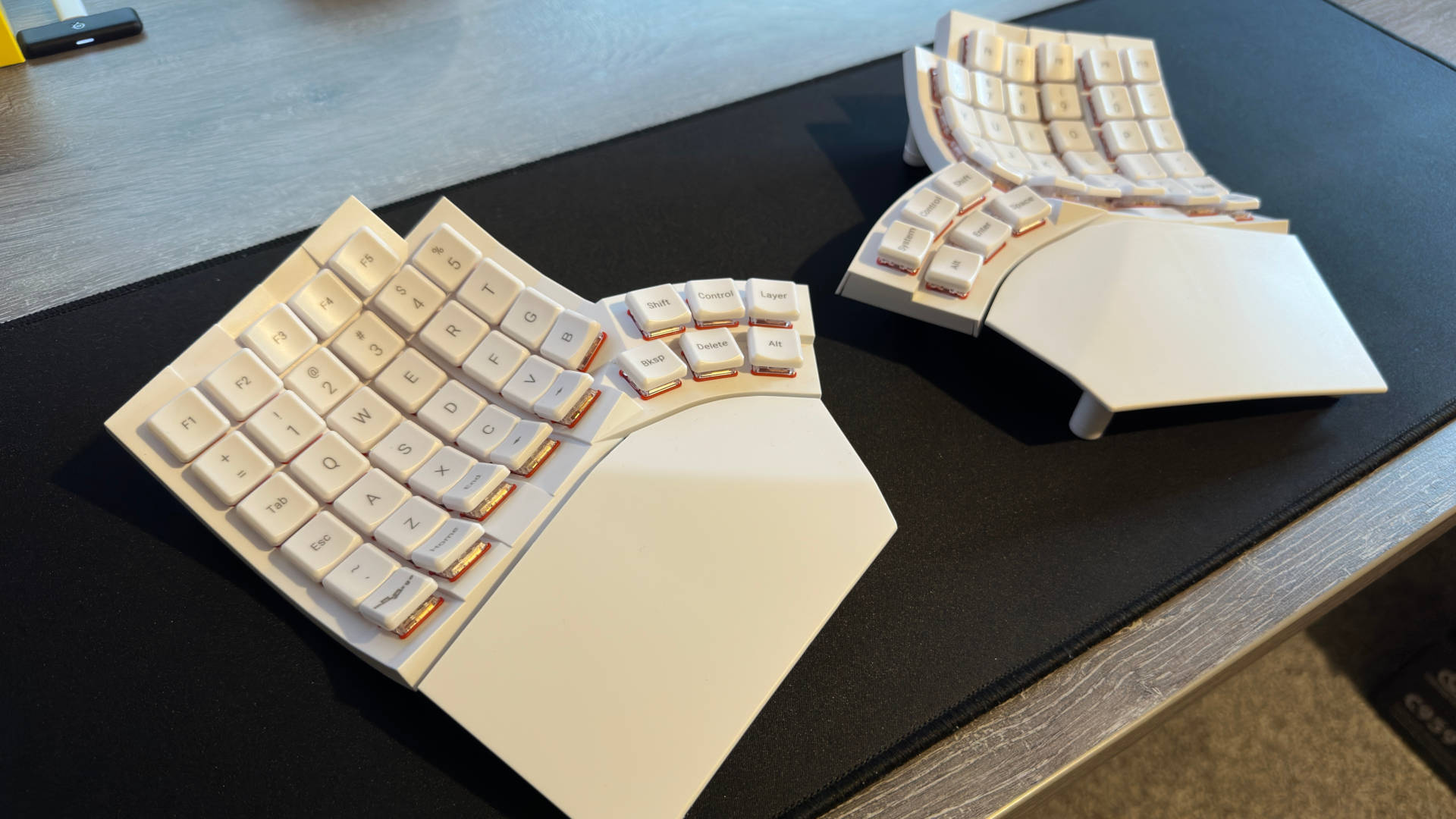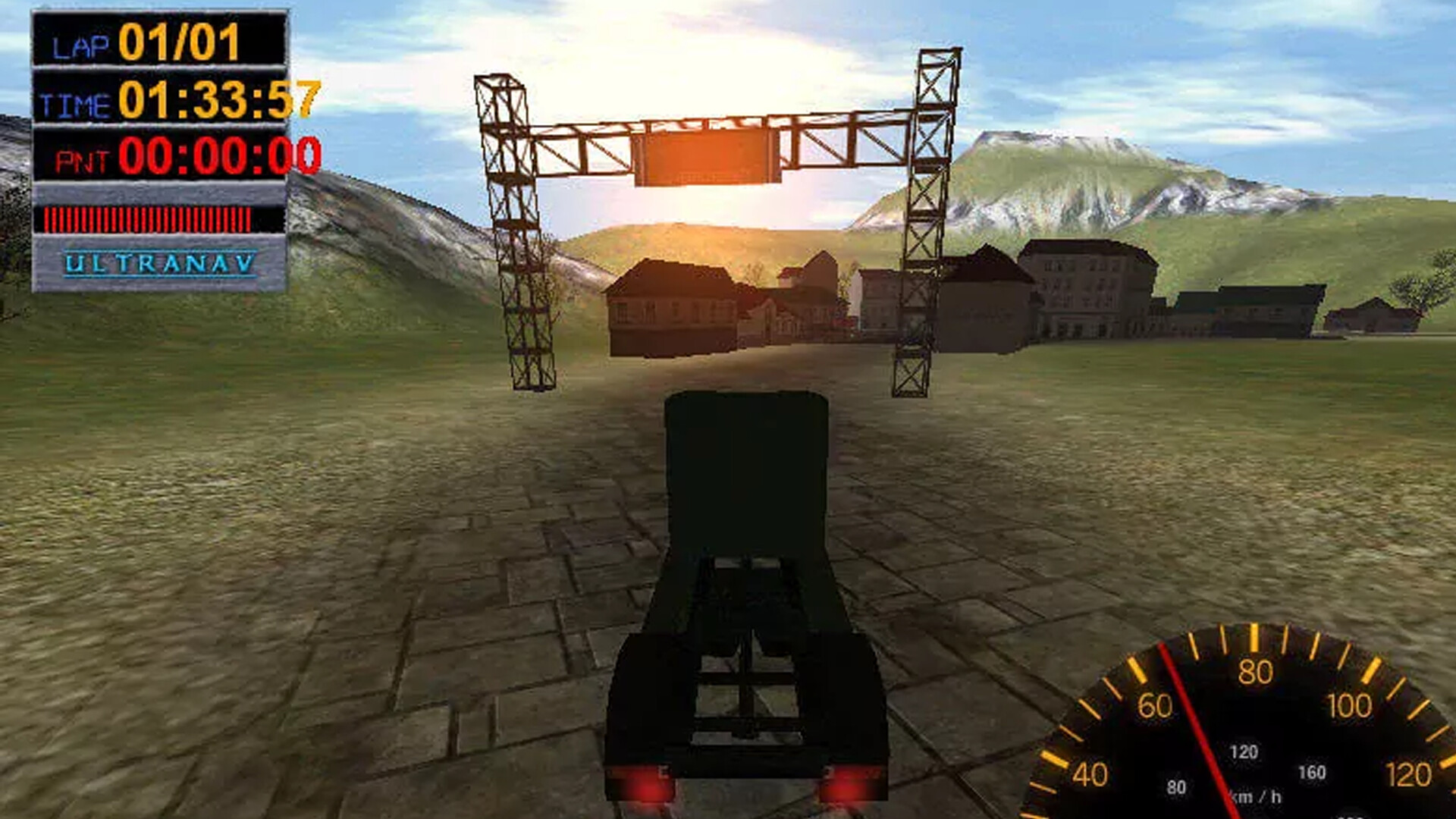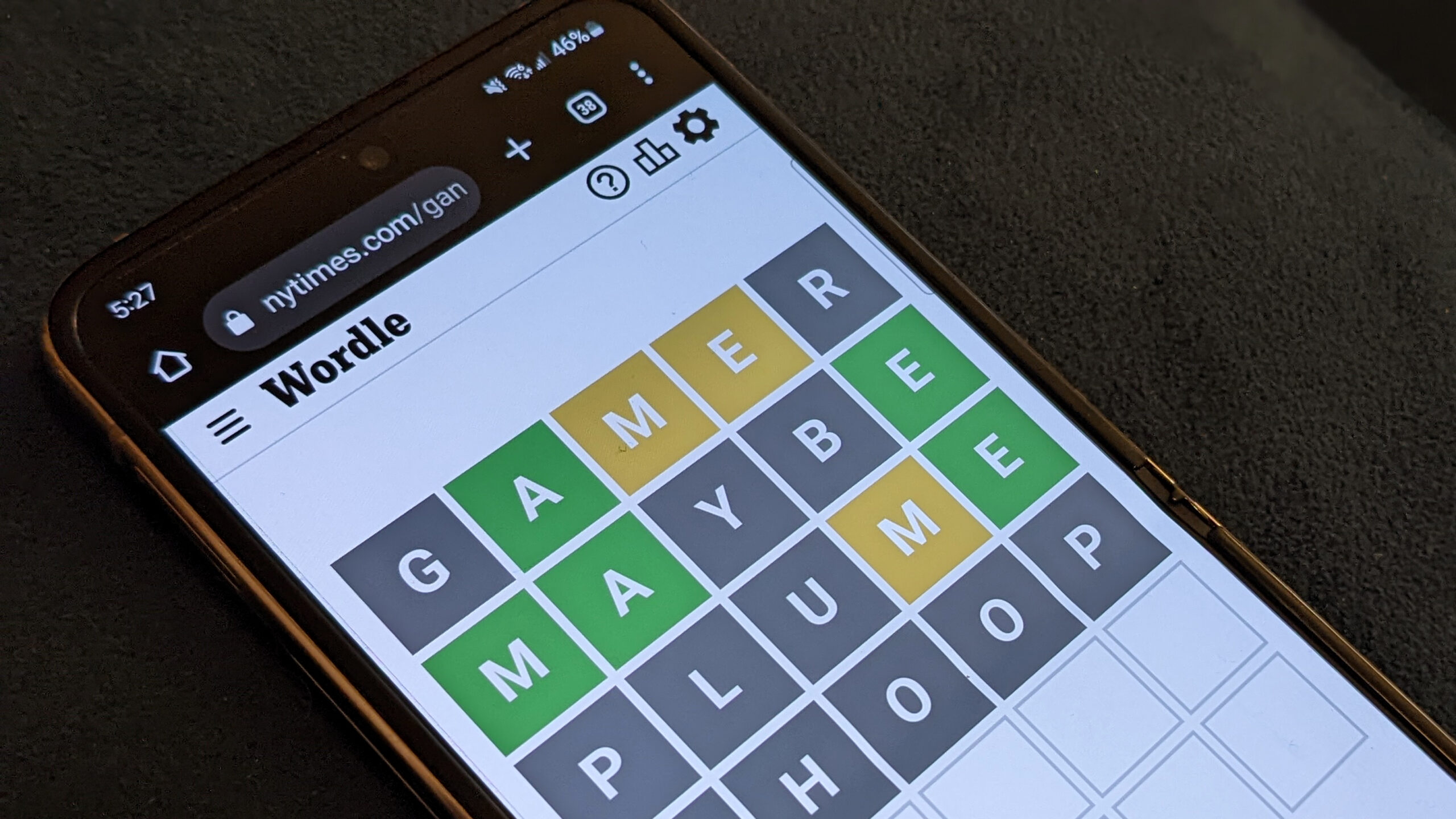Ergonomic keyboards pretty much come in one of four categories: not-really-ergo, entry-level, serious, and one for the absolutely committed. The MoErgo Glove80 is well and truly in the last one.
This particular model is a second revision of the original Glove80, first launched in 2022 after a successful Kickstarter campaign, following years of design, experimentation, and testing. MoErgo is a small firm, based in Wellington, New Zealand, and offers just the one keyboard, though with so much time and effort poured into the Glove80, such a small portfolio is understandable.
To call it an ergonomic keyboard is somewhat of a disservice, as it’s far too brief a description. What you have here is something that has been designed to the nth degree to minimise stresses on fingers, wrists, and shoulders that traditional keyboards generate, due to putting your body into an unnatural position.
The Glove80 achieves this by arranging keys in columns, making the key base concave, splitting the base in two, lowering the profile as much as possible, and providing the ability to change the tent and tilt as much as you could ever want. It’s by far the most adjustable keyboard that I’ve ever tested.
(Image credit: Future)
Switches: Kailh Choc Red/Brown/White
Connectivity: wired (USB Type-C) / wireless (BLE 5.0)
Keys: 80 in total, fully remappable
Split: fully separate halves, wireless connection
Tenting: continuously adjustable
Tilting: continuously adjustable
Backlighting: per-key RGB
Media controls: shortcuts via alternate key mode
Price: $399/£321/€375/AU$619
And I might as well get this out of the way now: It’s also the most expensive at $399 and it’s only available directly from MoErgo. That does include shipping fees to most countries, though some involve a small surcharge, and it’s duty-unpaid (but you’ll possibly not be required to pay import fees).
So what do you get for this hefty chunk of money? The keyboard, obviously, but it also comes in a decent travel case, plus a nice USB Type-C cable, a couple of spare key caps, and extra bits for changing the amount of tenting.
The cable is mostly just for charging each half, as it’s best used wirelessly, using a Bluetooth LE 5.0 connection. The same system is used for communications between the two sections, and it’s just the left side that connects to your PC or any BT-enabled device.
I have to admit that first impressions were a little muted, as the Glove80 is very light, around 600g. That’s by design, to make it as portable as possible, but if you’re like me and associate heft with quality, then you may feel a little short changed. I know I shouldn’t feel that way about any product but MoErgo has clearly fielded queries on the matter numerous times, given that it’s mentioned in the site’s FAQ.
It is very well built, though, and it felt extremely comfortable to use almost immediately. Some keyboard manufacturers offer pads to cushion your wrists but they’re entirely unnecessary with the Glove80, due to its ultra low profile.
The first thing I did was experiment with the tenting (raising the inner parts of the sections upwards) and tilting (lifting the wrist rests higher) options. That’s all done by adjusting the screw legs on which the feet attach and longer screws are included if you want to go way beyond 30 degrees of tent.
USB Type-C for charging or connecting to a computer (Image credit: Future)
Tenting and tilting options are as comprehensive as you could ever want. (Image credit: Future)
Your hands may or may not fit the concave nature of the key well. (Image credit: Future)
I have to say that I found it somewhat fiddly to set up, constantly going back and forth adjusting the legs until I was happy…only to change my mind and tweak it more 30 minutes later. I probably spent more time in the first day of using the Glove80 adjusting the legs than actually typing on it.
One positive is that the travel case is deep and well cushioned, allowing you to leave the legs set in position, if you need to go on your travels with the keyboard.
In the end, I reverted to its default setup, just so I could get on with the next episode of ‘Getting to grips with the Glove80’: The concave, columnar key arrangement. There’s no denying that this really is the best position to have the keys, to minimise stresses on your hands and wrists, but if you’ve already spent a long time using a standard layout, you’re probably going to be in for a lengthy adaption period.
After ten days of solid use, I was still well off my usual typing speed, but I was starting to get there. Keys such as Delete, Space, Enter, etc are all operated by your thumbs (though you can change that) and it took a while to stop myself from using my pinky for the likes of Enter and Control.
I also found the stagger in the heights of the key columns to be a tad intrusive. Where you barely have to raise your first three digits to hit most of the keys, I found that I had to lift my little finger more than I’d like to press the keys it’s designed to operate.
This is all part of the compromise that such a keyboard is going to have. I feel that MoErgo has got it almost spot on but I would have preferred a ‘smoother’ bowl shape to the key well.
RGB lighting can be subtle… (Image credit: Future)
…or so bright it will melt your face. (Image credit: Future)
Something else that needs plenty of adjustment time is gaming. Yes, it’s a ‘QWERTY’ layout but not in the usual sense, and you’ll need to remap controls in most games. If you can’t do that, because it’s an especially old game, then you’ll find that jumping while sprinting, or any other key combination that traditionally requires shift+space, just won’t be possible.
There is a small nod to the gaming fraternity in the form of per-key RGB lighting, which is adjustable via the keyboard itself. Should you so desire, you can set them so bright and lurid that you’ll be able to direct air traffic from the comfort of your home. I suspect I’m not alone in thinking it looks far nicer without all the bling lighting.
But this isn’t a ‘gaming’ keyboard. It’s all about ergonomics for day-long, all-year working at a computer, and even with my relatively brief time with it and grumbles about certain key positions, the Glove80 felt more comfortable than any other keyboard I’ve used so far.
And it’s arguably one of the most compact I’ve experienced, too.



With just 80 keys, it’s a serious reduction over the traditional layout, so you may be wondering just what’s been cut out to achieve this. Some of the space reduction comes from using small keys for Space, Control, and Enter; typically these are fairly large but since you operate them with your thumbs on the Glove80, their compact nature isn’t an issue.
If you look at the images of the keyboard, you’ll notice that there are no keys dedicated to F11 and F12. They are present, but you reach them via a second ‘layer’ by pressing the appropriately labelled Layer key.
This turns the right half into a number pad, with the left side offering function keys and arrow keys. Pressing the MoErgo key, in the bottom corner of the left section, activates the ‘magic’ layer, which gives you access to RGB controls, multiple Bluetooth profiles, and Bootloader mode.
The latter is used to upload new firmware onto the keyboard, which is required if you want to change the key layout. Don’t like where the space or enter keys are? Simple: Use MoErgo’s online editor to change the layout to how you want it, save the format as a file on your PC, and then upload it to each keyboard half (via a USB cable).
You’ll need to change the keycaps around, too, but the supplied tool makes this very easy to do. Though prising bits off a $399 keyboard for the first time is rather nerve-wracking.
I didn’t explore this aspect of the Glove80 too much but if this was my own keyboard, I’d spend a good deal of time using the default layout to understand what changes were necessary before delving into the layout editor. It is easy to use, fortunately, and the interface is helpful and well-designed.
The fact that no dedicated app is required to do this is especially nice, but fans of key combinations and macros will need to sit down and go through the editor’s manual very carefully before creating any custom key behaviours. It’s not especially complicated but neither is it designed for total macro newbies.
(Image credit: MoErgo)
(Image credit: MoErgo)
(Image credit: MoErgo)
If I’m to be honest, ‘not for newbies’ is an appropriate mantra for the Glove80, or at the very least, not for the uncommitted.
This is not a novelty keyboard nor does it hold your hand, as it were, when it comes to adapting your keyboard habits. You could be dead set on making the change, in order to reap the benefits that a fully ergonomic keyboard can offer, only to find that the shape of your hand doesn’t quite match the curvature of the key well and column height staggers.
The Glove80 felt more comfortable than any other keyboard I’ve used
The Glove80 is priced well into the boutique sector of keyboards and I should imagine many followers of that crowd would bemoan the lack of hot-swappable key switches or the requirement to use a key extension to access F11 and F12. Some may feel that its very light weight detracts from the feeling of quality, even though it makes the keyboard extremely portable.
I’d prefer it to have a few more keys in general, as I don’t mind moving my hands about to reach what I need, and I’d also like fewer thumb keys, as I lack a bit of mobility in those digits.
All of this was weighing on my mind when it came time to rate the whole package and give the Glove80 a final score. It’s very well-designed and exhibits all the hallmarks of a detailed, intricate engineering project. If you’re like me and suffer with wrist and shoulder problems, anything that helps to ease pain and discomfort is worth investing in, especially if it’s something you’ll rely on day in, day out.
On that basis alone, the Glove80 is superb and the niggles I’ve mentioned are more down to personal preferences, rather than flaws in the engineering or design. If you just want a comfortable gaming keyboard, though, this is absolutely not for you.
However, if you want the best possible support and comfort for your body, and you’re willing to pay for it in time and money, then the MoErgo Glove80 has to be seriously considered.











